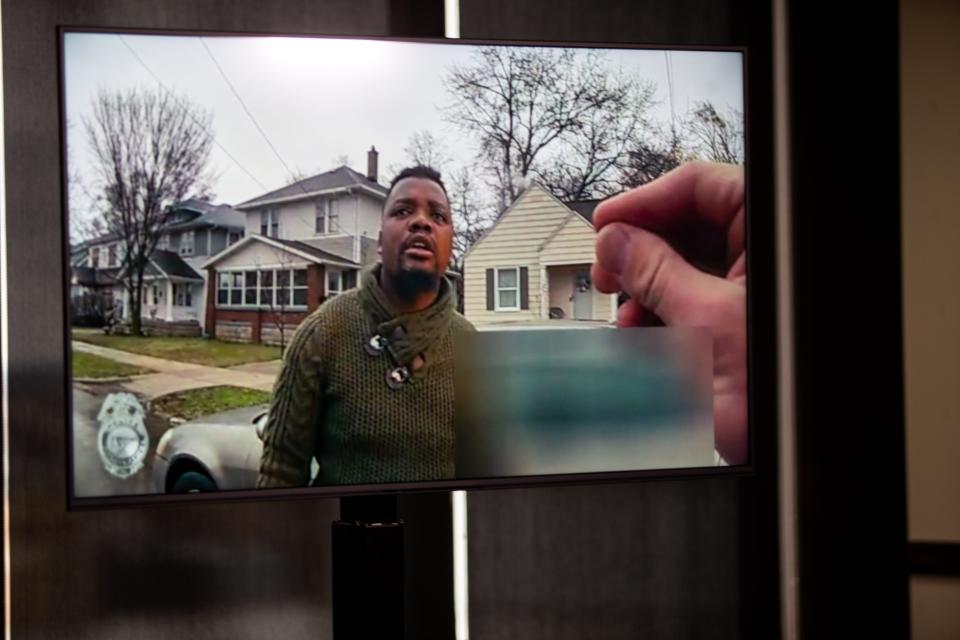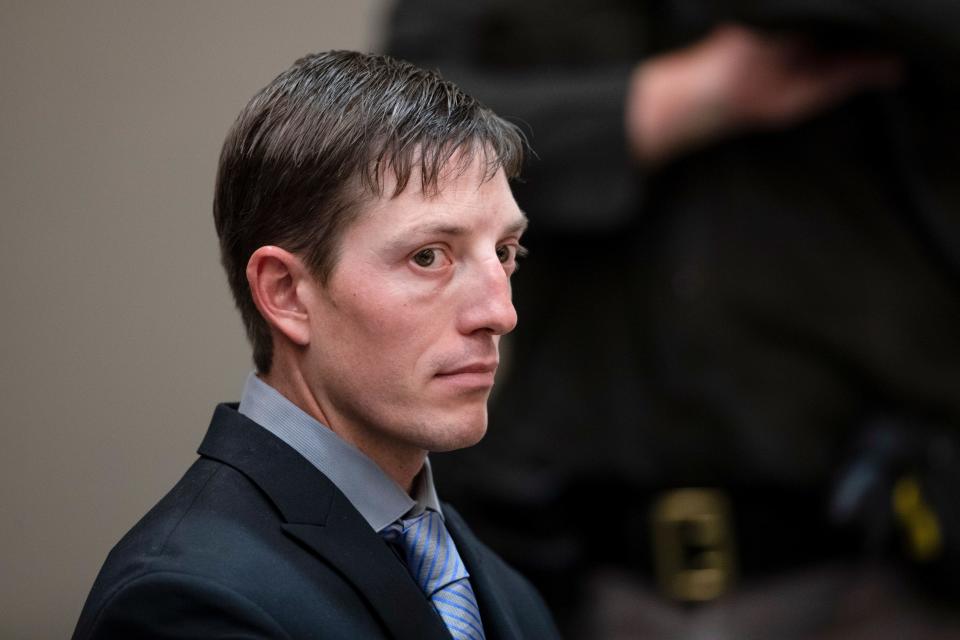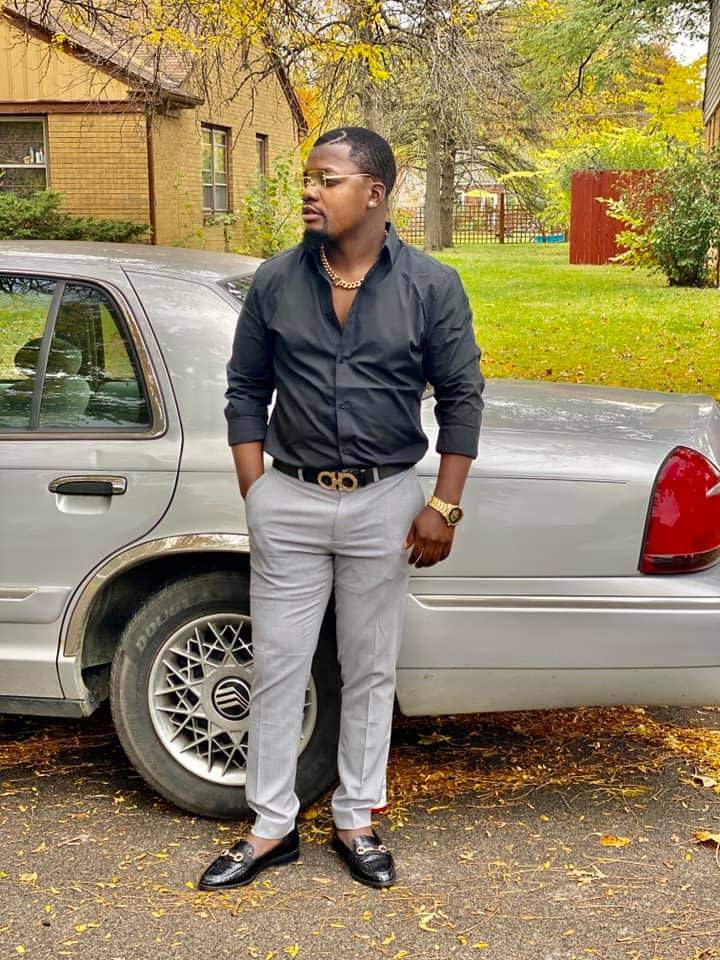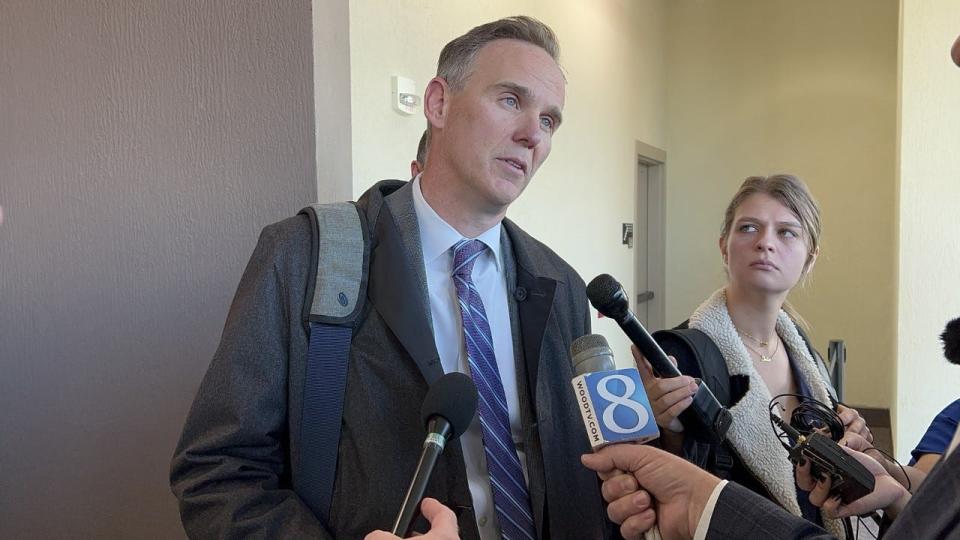Appeals panel will decide on trial for ex-officer charged in shooting of Patrick Lyoya
The attorney for the former Grand Rapids police officer charged with second-degree murder in the fatal shooting of a Black man during a traffic stop last year argued in court Wednesday that police officers are justified in using lethal force in certain scenarios, and that binding former officer Christopher Schurr over for trial would harm the legal rights of police.
Schurr was charged a few months after the fatal shooting of Patrick Lyoya, a Congolese refugee who was 26 at the time of his death. Schurr pulled over Lyoya on April 4, 2022, in the southeast part of Grand Rapids, and Lyoya later attempted to run away from the officer. Following a physical struggle, Schurr fatally shot Lyoya in the back of the head while Lyoya was facedown on the ground, video of the interaction shows.
Last year, a Kent County district judge bound Schurr over to stand trial for the second-degree murder charge, which Schurr's attorneys have appealed. Schurr's lead attorney, Matthew Borgula, argued to a three-judge Court of Appeals panel Wednesday that lower courts erred in binding the officer over for trial. Prosecutors countered by saying the question of the need for lethal force by Schurr is one for a jury to answer.

Schurr 'has a right to self-defense,' lawyer says
Borgula told the panel that Schurr was following his training as an officer during the incident leading up to the fatal shooting of Lyoya. After being pulled over, Lyoya exited his car and appeared not to understand Schurr's commands, video released by the Grand Rapids Police Department and shown in court shows.
When Lyoya tried to flee, the officer chased him through nearby front yards and eventually tackled him. Schurr attempted to use his stun gun on Lyoya, but missed with both discharges. Following the missed attempts, Lyoya tried to grab the Taser.
Lyoya grabbing the Taser justified the use of force, Borgula argued, saying: "The officer always has a right to self-defense.
"He ultimately disarms the officer of his taser. ... The officer tried everything he could in his training experience to arrest Mr. Lyoya without using deadly force."
Borgula referenced testimony from Grand Rapids Police Capt. Chad McKersie, who testified in previous hearings that Schurr appeared to have followed training protocols leading up to the shooting of Lyoya.
Schurr was seated in the courtroom Wednesday. He was fired from his position with the department shortly after Kent County Prosecutor Chris Becker announced the charge last July. After the hearing concluded, Borgula told reporters that Schurr was "making a living" although no longer as a police officer. He didn't disclose the nature of Schurr's new employment.

Prosecutor: Jury must decide if lethal force was necessary
Katherine Wendt, Kent County chief appellate attorney, told the panel that a jury should be the body to decide if Schurr was justified in fatally shooting Lyoya. The district judge was correct in binding Schurr over, Wendt argued, because the standard of evidence needed to bind a person over at a preliminary hearing is lower than the beyond-a-reasonable-doubt standard needed to convict someone at a trial.
"Certainly, a jury could agree with the defense, but that's a question that must be submitted to the jury … after they consider the evidence that (Lyoya) was just trying to get away," she said.
Wendt, in court and previously in written briefs submitted to the panel, said that individual circumstances must be considered when deciding if the use of lethal force by a police officer was justified.
"I can't imagine any court saying an officer can shoot someone for disobeying a command," she said, noting there may be scenarios where an individual is unable to understand what an officer is asking them to do.
"There has to be parameters for safeguarding life," Wendt added.
Judge questions Taser's involvement
Presiding Judge Brock Swartzle asked both the defense and prosecution whether the Taser Schurr attempted to deploy and was later grabbed at by Lyoya was a deadly weapon, particularly in the "drive stun" mode when its cartridges have already been deployed but the stun gun could still be used in direct contact with an individual.
"Do you a consider a Taser in drive stun mode as a dangerous weapon?" Swartzle asked Wendt.
"Certainly, a jury could agree with the defense, but that's a question that must be submitted to the jury …after they consider the evidence that (Lyoya) was just trying to get away," Wendt replied.

Calls for justice, accountability continue
Outside the court building in Grand Rapids, about a dozen demonstrators gathered before the hearing, chanting "Justice for Patrick" and holding signs displaying "BLM" for the Black Lives Matter movement. Since Lyoya's shooting, residents have called for police accountability in Grand Rapids, particularly when it comes to interacting with the city's Black community. Police in Grand Rapids have also retooled training standards and adopted policies emphasizing de-escalation tactics and stating the department’s “highest priority is the sanctity of human life.”
Some supporters of Schurr were also present before the hearing began, holding a "thin blue line" flag. The thin blue line has become a symbol of support for law enforcement in recent years.
What's next in the legal case
A decision by the panel could come in the next few months, Borgula said, although he expects a subsequent appeal of the panel's decision to follow, however it rules. Becker did not take questions from reporters after the hearing concluded.

A jury trial was originally slated to take place earlier this year but was delayed until October. That trial has again been adjourned pending the outcome of the appeal.
Lyoya's father, Peter Lyoya, attended Wednesday's hearing, accompanied by attorney Ven Johnson. Johnson is representing the Lyoya family in a civil case against Schurr and the Grand Rapids Police Department. The lawsuit alleges Schurr violated Lyoya's civil rights, and seeks damages of $100 million.
Contact Arpan Lobo: alobo@freepress.com. Follow him on Twitter @arpanlobo.
This article originally appeared on Detroit Free Press: Court of Appeals hears case of ex-officer charged in Lyoya shooting

